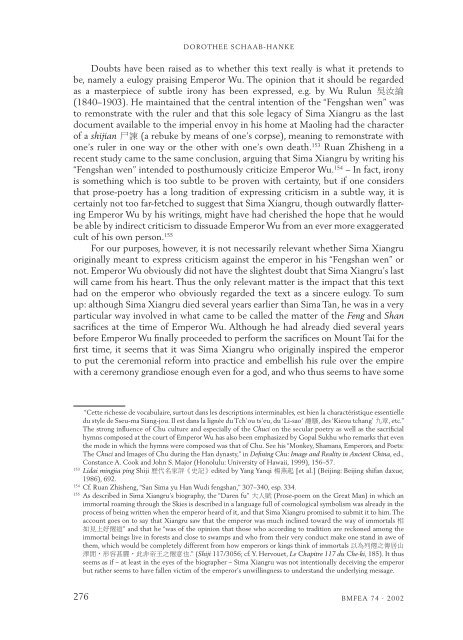The Power of an Alleged Tradition - CHINA Buchservice
The Power of an Alleged Tradition - CHINA Buchservice
The Power of an Alleged Tradition - CHINA Buchservice
Create successful ePaper yourself
Turn your PDF publications into a flip-book with our unique Google optimized e-Paper software.
Doubts have been raised as to whether this text really is what it pretends to<br />
be, namely a eulogy praising Emperor Wu. <strong>The</strong> opinion that it should be regarded<br />
as a masterpiece <strong>of</strong> subtle irony has been expressed, e.g. by Wu Rulun ���<br />
(1840–1903). He maintained that the central intention <strong>of</strong> the “Fengsh<strong>an</strong> wen” was<br />
to remonstrate with the ruler <strong>an</strong>d that this sole legacy <strong>of</strong> Sima Xi<strong>an</strong>gru as the last<br />
document available to the imperial envoy in his home at Maoling had the character<br />
<strong>of</strong> a shiji<strong>an</strong>��� (a rebuke by me<strong>an</strong>s <strong>of</strong> one’s corpse), me<strong>an</strong>ing to remonstrate with<br />
one’s ruler in one way or the other with one’s own death. 153 Ru<strong>an</strong> Zhisheng in a<br />
recent study came to the same conclusion, arguing that Sima Xi<strong>an</strong>gru by writing his<br />
“Fengsh<strong>an</strong> wen” intended to posthumously criticize Emperor Wu. 154 – In fact, irony<br />
is something which is too subtle to be proven with certainty, but if one considers<br />
that prose-poetry has a long tradition <strong>of</strong> expressing criticism in a subtle way, it is<br />
certainly not too far-fetched to suggest that Sima Xi<strong>an</strong>gru, though outwardly fl attering<br />
Emperor Wu by his writings, might have had cherished the hope that he would<br />
be able by indirect criticism to dissuade Emperor Wu from <strong>an</strong> ever more exaggerated<br />
cult <strong>of</strong> his own person. 155<br />
For our purposes, however, it is not necessarily relev<strong>an</strong>t whether Sima Xi<strong>an</strong>gru<br />
originally me<strong>an</strong>t to express criticism against the emperor in his “Fengsh<strong>an</strong> wen” or<br />
not. Emperor Wu obviously did not have the slightest doubt that Sima Xi<strong>an</strong>gru’s last<br />
will came from his heart. Thus the only relev<strong>an</strong>t matter is the impact that this text<br />
had on the emperor who obviously regarded the text as a sincere eulogy. To sum<br />
up: although Sima Xi<strong>an</strong>gru died several years earlier th<strong>an</strong> Sima T<strong>an</strong>, he was in a very<br />
particular way involved in what came to be called the matter <strong>of</strong> the Feng <strong>an</strong>d Sh<strong>an</strong><br />
sacrifi ces at the time <strong>of</strong> Emperor Wu. Although he had already died several years<br />
before Emperor Wu fi nally proceeded to perform the sacrifi ces on Mount Tai for the<br />
fi rst time, it seems that it was Sima Xi<strong>an</strong>gru who originally inspired the emperor<br />
to put the ceremonial reform into practice <strong>an</strong>d embellish his rule over the empire<br />
with a ceremony gr<strong>an</strong>diose enough even for a god, <strong>an</strong>d who thus seems to have some<br />
“Cette richesse de vocabulaire, surtout d<strong>an</strong>s les descriptions interminables, est bien la charactéristique essentielle<br />
du style de Sseu-ma Si<strong>an</strong>g-jou. Il est d<strong>an</strong>s la lignée du Tch’ou ts’eu, du ‘Li-sao’���, des ‘Kieou tch<strong>an</strong>g’ ��, etc.”<br />
<strong>The</strong> strong infl uence <strong>of</strong> Chu culture <strong>an</strong>d especially <strong>of</strong> the Chuci on the secular poetry as well as the sacrifi cial<br />
hymns composed at the court <strong>of</strong> Emperor Wu has also been emphasized by Gopal Sukhu who remarks that even<br />
the mode in which the hymns were composed was that <strong>of</strong> Chu. See his “Monkey, Sham<strong>an</strong>s, Emperors, <strong>an</strong>d Poets:<br />
<strong>The</strong> Chuci <strong>an</strong>d Images <strong>of</strong> Chu during the H<strong>an</strong> dynasty,” in Defi ning Chu: Image <strong>an</strong>d Reality in Ancient China, ed.,<br />
Const<strong>an</strong>ce A. Cook <strong>an</strong>d John S. Major (Honolulu: University <strong>of</strong> Hawaii, 1999), 156–57.<br />
153 Lidai mingjia ping Shiji ���������edited by Y<strong>an</strong>g Y<strong>an</strong>qi ��� [et al.] (Beijing: Beijing shif<strong>an</strong> daxue,<br />
1986), 692.<br />
154 Cf. Ru<strong>an</strong> Zhisheng, “S<strong>an</strong> Sima yu H<strong>an</strong> Wudi fengsh<strong>an</strong>,” 307–340, esp. 334.<br />
155 As described in Sima Xi<strong>an</strong>gru’s biography, the “Daren fu”���� (Prose-poem on the Great M<strong>an</strong>) in which <strong>an</strong><br />
immortal roaming through the Skies is described in a l<strong>an</strong>guage full <strong>of</strong> cosmological symbolism was already in the<br />
process <strong>of</strong> being written when the emperor heard <strong>of</strong> it, <strong>an</strong>d that Sima Xi<strong>an</strong>gru promised to submit it to him. <strong>The</strong><br />
account goes on to say that Xi<strong>an</strong>gru saw that the emperor was much inclined toward the way <strong>of</strong> immortals �<br />
������” <strong>an</strong>d that he “was <strong>of</strong> the opinion that those who according to tradition are reckoned among the<br />
immortal beings live in forests <strong>an</strong>d close to swamps <strong>an</strong>d who from their very conduct make one st<strong>an</strong>d in awe <strong>of</strong><br />
them, which would be completely different from how emperors or kings think <strong>of</strong> immortals ��������<br />
����������������.” (Shiji 117/3056; cf. Y. Hervouet, Le Chapitre 117 du Che-ki, 185). It thus<br />
seems as if – at least in the eyes <strong>of</strong> the biographer – Sima Xi<strong>an</strong>gru was not intentionally deceiving the emperor<br />
but rather seems to have fallen victim <strong>of</strong> the emperor’s unwillingness to underst<strong>an</strong>d the underlying message.<br />
276<br />
DOROTHEE SCHAAB-HANKE<br />
BMFEA 74 · 2002


